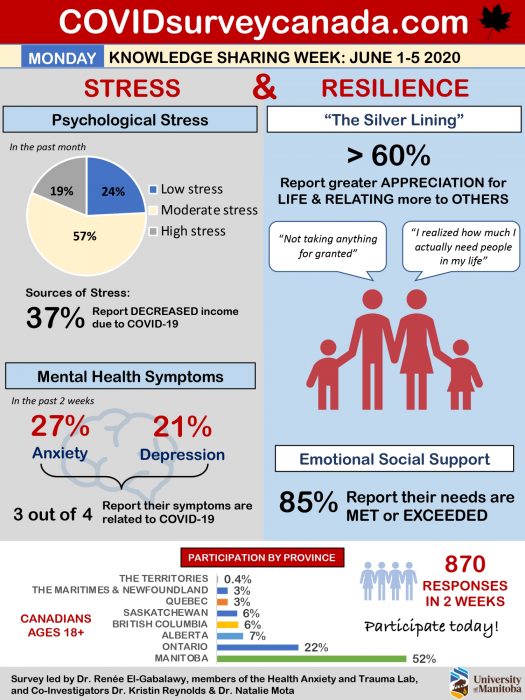
Majority of Canadians experiencing COVID-19-related stress, ‘mental health wave’ predicted: UM study’s early findings
Researchers from the Rady Faculty of Health Sciences are leading a study to learn more about what factors may predict or prevent stress during and following the COVID-19 pandemic.
The research is being led by Dr. Renée El-Gabalawy, assistant professor of clinical health psychology and anesthesiology, perioperative and pain medicine, members of the Health, Anxiety and Trauma Lab at UM, along with co-investigators Dr. Kristin Reynolds, assistant professor of psychology, and Dr. Natalie Mota, assistant professor, clinical health psychology.
While early studies from China are reporting elevated estimates of post-traumatic stress, depression and anxiety, health-care providers know very little about COVID-related mental health among Canadians. The researchers hope to gain a better understanding of how they might help people who are currently struggling, and those in similar situations in the future.
“We are in uncharted territory and the mental health needs of Canadians will be unique during this pandemic,” says El-Gabalawy. “Understanding the impact of COVID-19 among Canadians is essential to develop prevention initiatives and targeted interventions.”
In light of this gap in understanding, and to facilitate the development of targeted treatments, the research team is disseminating early findings from their ongoing national mental health survey on risk and resiliency among Canadians during COVID-19, https://www.covidsurveycanada.com, which launched May 15.
Starting Monday, June 1, coinciding with Post-Traumatic Stress Disorder Awareness Month, they will be disseminating a daily infographic for one week via El-Gabalawy’s Twitter account @UM_HATLab.
The first infographic includes early data from 870 Canadians demonstrating that 76 per cent experienced moderate to high levels of psychological stress in the past month. Further, 27 per cent experienced clinically significant symptoms of anxiety while 21 per cent experienced clinically significant symptoms of depression in the past two weeks. A staggering 75 per cent attribute these elevated anxiety and depressive symptoms directly to the COVID-19 pandemic.

The infographic schedule is as follows:
Monday, June 1: Stress and Resiliency Among Canadians
Tuesday, June 2: How are Canadians Coping?
Wednesday, June 3: Pandemic Response Among Medically Vulnerable Groups
Thursday, June 4: Pandemic Response Among Essential and Frontline Service Workers
Friday, June 5: Gender and Health
The researchers state that the “COVID-19 pandemic has resulted in unprecedented societal stress related to physical distancing mandates, fear of contraction of illness, economic stress, childcare stress, and challenges in accessing healthcare, among others. As rates of new cases are decreasing across the nation, health professionals are anticipating a second ‘mental health wave.’”
Despite these challenges, 85 per cent indicate their social support needs are being met or have been exceeded. In fact, over 60 per cent of Canadians are reporting that the pandemic has significantly elevated their ability to relate to others and resulted in greater appreciation for life.
“In our survey, we are not only interested in the risk factors associated with compromised mental health but also the protective factors, and what promotes resiliency in this context,” says El-Gabalawy.
The team will continue to collect data until July 15, and will follow-up with consenting participants at six months and one year to understand the longitudinal mental health effects.
Canadian residents or citizens that are 18 years or older are eligible to participate at https://www.covidsurveycanada.com.
Men and Eastern provinces including Quebec are currently underrepresented in their data and they hope that early dissemination will facilitate greater participation among these groups.
The website contains an extensive list of mental health resources available in Canada.






